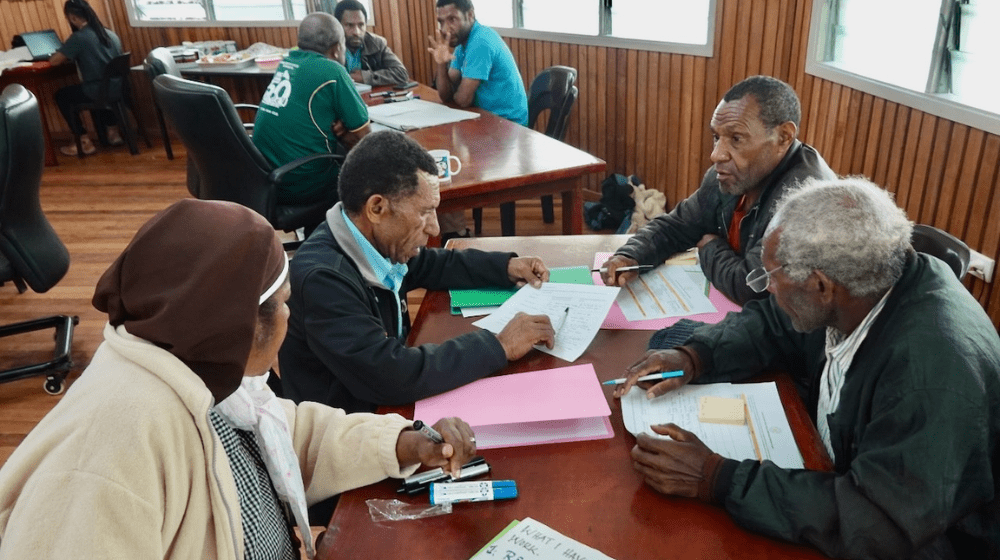In the Highlands Region of Papua New Guinea's Simbu Province, the destructive forces of Sorcery Accusation-Related Violence (SARV), Gender-Based Violence (GBV), and substance abuse have deeply affected communities, often exacerbated by complex interpersonal conflicts and deep-rooted beliefs in witchcraft and sorcery.
Vulnerable individuals have been the primary targets of SARV in Papua New Guinea, with recent statistics showing that cases are evenly distributed between women and men, each comprising 50 percent of the reports. Yet, amidst this long-standing crisis, a new sense of hope is emerging.
Thanks to a comprehensive training and awareness programme led by the United Nations Population Fund (UNFPA) and funded by the Korea International Cooperation Agency (KOICA) through the Melanesian Institute in Goroka, over 7,000 people have been reached.
This effort empowers local leaders and communities to break the cycle of violence and foster positive change.
The Melanesian Institute, through a consortium of seven churches, is moving from school to school, utilizing pastoral programs to reach communities with education and messages on SARV and GBV.
This initiative challenges social and gender norms by instilling positive spiritual and cultural values that align with what it means to be Christian and Melanesian, while respecting the rights of each individual.
Peter Kelly, Director of Nursing Services at Migende Rural Hospital, has been on the front lines of this transformation. Overseeing more than 50 nurses, Kelly has witnessed the devastating impact of sorcery accusations firsthand.
"We handle many of these cases," he explains. "In areas where belief in sorcery is strong, if medical professionals don’t clearly explain the cause of death, they may unintentionally fuel suspicion, leading to violence."
This issue hit close to home for Kelly when his brother died. "Some of my family members blamed sorcery," he recalls. "I had to step in and explain that his death was due to a medical condition—something scientifically proven, not sorcery."
The SARV training has profoundly shifted Kelly’s perspective. He now champions a more comprehensive approach to care for survivors.
"Hospitals must offer more than just medical care," Kelly emphasizes. "We need a holistic approach that includes psychological, spiritual, and mental support. SARV survivors are traumatized, and they need specialized care. Hospitals should have trained personnel to rehabilitate survivors, provide counseling, and eventually help reunite them with their families."
Kelly has even established a small unit at his hospital to care for SARV survivors but faces challenges due to limited resources. "We lack the funding to manage these cases effectively," he shares. Despite these hurdles, his commitment to making a difference remains unwavering.
Leaders like Judy Gelua, Caritas coordinator from the Diocese of Kundiawa, are also making significant strides. Gelua has used her training to educate young people about the dangers of SARV, GBV, and substance abuse.
"When youth are educated, they become advocates and help reduce these harmful practices," she explains. "Thanks to the training, we’ve set up a SARV legal desk at the Diocese, providing legal advice to survivors and their families. We also emphasize in our churches the importance of seeking legal redress instead of resorting to violence."
Ennio Kuble, a journalist and community development advocate in Simbu, highlights the critical role youth play in perpetuating or preventing violence.
"Perpetrators are often young people who exploit unexplained deaths in the community for financial gain," he says. "We need to engage young people in sustainable livelihood programmes to steer them away from violence."
The training has not only equipped local leaders with practical skills but has also transformed their outlook on SARV. Fr. Christopher Ouyuglo, a catholic priest and a community leader working with drug addicts through the St. Christopher Alai Association, shares how the training reshaped his understanding.
"The biggest challenge is that we’re not addressing sorcery cases the right way," he notes. "We should work with faith-based organizations to help youth and support them in livelihood activities."
Fr. Ouyuglo, adds, "Many of the perpetrators are youths who are drug addicts. I realized that SARV victims lose their sense of value and confidence. They become voiceless. We must restore their hope and involve them in community activities to help them rebuild their lives."
In Simbu, where fear and violence have long reigned, the SARV training has become a beacon of hope. Empowered by the knowledge and skills gained, community leaders like Kelly, Gelua, and Fr. Ouyuglo are working tirelessly to restore peace, justice, and dignity to those who have suffered in silence for far too long.
UNFPA’s efforts in Papua New Guinea extend beyond SARV to address gender-based violence (GBV) and other harmful practices. By partnering with the government and key stakeholders, UNFPA is challenging deeply ingrained gender norms and social discrimination.
The organization also continues to build the capacity of government and civil society actors to respond to GBV, particularly through healthcare providers, Family Support Centres (FSCs), and Mental Health and Psychosocial Support (MHPSS).
Through these efforts, survivors and affected communities are finding the support they need to rebuild their lives. As Kelly reflects, "It’s not just about treating the body; it’s about healing the spirit and restoring hope."


